occupy movement
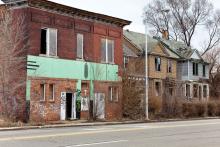
THE STATE OF THE U.S. working class gives us many reasons to feel discouraged. Wages have stagnated even as productivity has increased significantly. With independent contracting and the “gig economy,” jobs have become less secure. The Bureau of Labor Statistics predicts that most job growth will be in low-paying fields, such as home health care and food service. Union membership, a central measure of the social cohesion and political power of the working class, has fallen to 11 percent, down by almost half since the early 1980s.
Medical research links economic frustration to rising death rates among middle-aged whites and addiction among younger adults. Long encouraged to believe that hard work would translate into economic stability, working-class people have, as one of the researchers, Angus Deaton, put it, “lost the narrative of their lives.”
Two important shifts in how people think about class and work suggest reasons for cautious optimism. They also suggest possible roles for faith-based organizations.
The first reason might seem counter-intuitive: Americans in general, and younger Americans in particular, increasingly identify themselves as working class. Gallup polls over the past 15 years show that the number of Americans who identify themselves as upper-middle or middle class has fallen by 12 percent, while the number who identify as lower or working class has risen by 15 percent. More than 56 percent of millennials identify as working class, compared with 44.2 percent of baby boomers. Even younger adults with college degrees—which pollsters often use to identify respondents as middle-class—find themselves working part-time, low-wage jobs, struggling with student loan debt, and unable to afford the traditional markers of adulthood, such as home ownership. These surveys (and this year’s political campaigns) suggest growing anger over economic inequality, but as community organizers know, frustration and anger can inspire action.
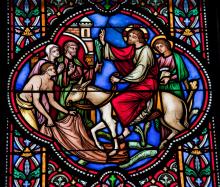
Protests in Ferguson, rallies in Hong Kong, and the Occupy Movement: People challenging systems and structures clamber for my attention. But faithful followers of Jesus shouldn’t get involved in these political and economic wrangling, should they? Sure, we ought to pay our taxes and vote; you know, give to Caesar and all that. But Christians should only be concerned about the spiritual transformation of individuals, not gallivanting around to rail against political and economic systems. After all, Jesus never protested political or economic policies did he? If we transform enough people, won’t the rest of the systemic issues work themselves out?
I have heard this challenge to Christian involvement in social movements numerous times, and it holds a certain appeal for someone like me who is allergic to politics. I’m the no-bumper-sticker, no-yard-sign guy who would just as soon steer a discussion away from upcoming elections than face the discussion of large-scale political or economic issues. I’d much rather focus on individual spirituality. After all, Jesus never did march on Rome or speak out against Caesar’s cruel dictatorship. He doesn’t mean for us to get mixed up in social, political or economic activism.
Or does he? I am learning to re-examine the cultural lenses by which I encounter Christ in scriptures.

America is at a crossroads: We live in a society that promotes working for our own ends, but if we are to survive and flourish it is time to start sacrificing for the common good by working together.
In early April, advocates for public education traveled to Washington D.C. for Occupy the Department of Education (Occupy the DOE). Students, parents, educators, and community members came together to protest a current system that is designed to segregate our society, while demanding a public education system that devotes itself to the common good through sacrifice of self for the love of the whole.
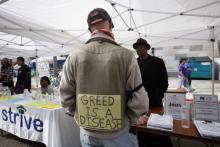
Christianity Today’s film This is Our City is provocative because of its gritty, grounded honesty. This is not a film about political pundits who banter back and forth exchanging policy talking points. No. This short film reveals the lives and thinking of two very ordinary people, their deep faith in Jesus, and how that faith is leading them to engage two of the most consequential grassroots movements of our time. These two movements share one beautiful thing in common; they are groundswells of ordinary citizens reengaging their democratic civic duty—to let their messages by heard and considered in the public square.
D.C. Innes rightly points out in his reflections that the film’s title, “Liberty or Justice for All,” and its structure seem to pit the virtues of liberty and justice against one another. Within the first minute of this nearly seven-minute film, liberty is clearly the motivation for Emmett Bailey’s Virginia Tea Party involvement, while the motivation for Pam Hogeweide’s Occupy Portland involvement is clearly “justice.” And both subjects say their involvement is an outworking of their faith.
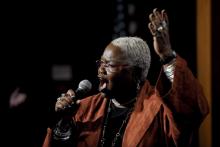
“I woke up this morning with my mind set on justice...”
So sang Sweet Honey In the Rock’s Dr. Ysaye Barnwell this morning. And, sitting in a room with hundreds of activists, occupiers and people of similar persuasions, it was hard not to embrace that mindset.
Maybe it’s a failing of my own, and a comment on my devotion to the 24-hour news cycle, but recently I have lost sight of the excitement and intent that the Occupy movement originally injected into the psyche of the nation.
Blessedly, this morning’s gathering, in the welcoming environment of Church of the Pilgrims in Washington, D.C., was an opportunity to hear once again words of hope, energy and defiance. The People’s Prayer Breakfast was everything I hoped and expected it to be.
It was friendly, optimistic and (as there should be at any good breakfast meeting), there was food aplenty for everyone in the bustling hall beneath the church — a mishmash of young, old, people of different faith traditions and various cultures. A large contingent of students from a local Quaker school injected a youthful optimism into the morning (filling the energy gap that even a strong coffee could not supply at 7:30 a.m.)
The atmosphere was one of peace and contentment. And yet, at the same time, there was urgency in the voices of those who addressed us.
The Occupiers have returned to Zucotti Park!
The barricades that have kept them out since the park was cleared November 15 are gone and steady streams of protestors are returning to their adopted home.
It remains to be seen whether the camp will be allowed to return to its former glory, or whether the security guards who have been controlling entry to the plaza will keep the returning protestors on a tight leash. According to The Associated Press
One security guard told a group of protesters: "No sleeping bags allowed, either, OK, folks?"
Consensus decision-making can make an old-style Senate filibuster seem purposeful and engaging.

Occupy Movement : Winning?; House Votes On Payroll Tax Extension Plan Today; What Advent Has In Common With Occupy Wall Street; Gingrich Has It Wrong About The Poor (OPINION); Occupy The Left; Panetta Optimistic About Afghanistan.
Late Friday afternoon, UC Davis campus minister, the Rev. Kristin Stoneking, was in the car driving with her family from Davis to the American Academy of Religion gathering in San Francisco when she received a phone call from a campus administrator. Katehi was "trapped" inside her office at the university administration building, where a large crowd of protesters had gathered outside, flanking both sides of the sidewalk in front of the building's entrance. The chancellor was afraid to leave on her own and asked Stoneking to come mediate her exit with students.
Stoneking was running late, having missed a few of the AAR's sessions already, and was reluctant to heed the call. She called one of the students involved in organizing the Occupy protests on campus and learned that, "students were surrounding the building but had committed to a peaceful, silent exit for those inside and had created a clear walkway to the street." So she turned the car around and drove back to the university.
"Why did I walk the Chancellor to her car? Because I believe in the humanity of all persons," Stoneking writes. "Because I believe that people should be assisted when they are afraid. Because I believe that in showing compassion we embrace a nonviolent way of life that emanates to those whom we refuse to see as enemies and in turn leads to the change that we all seek. I am well aware that my actions were looked on with suspicion by some tonight, but I trust that those seeking a nonviolent solution will know that 'just means lead to just ends' and my actions offered dignity not harm."

Over the weekend, our friend Paul Brandeis Raushenbush, senior religion editor for the Huffington Post, was a guest on NPR's "On Being" program with host Krista Tippett, to talk about how the Social Gospel movement of the early 20th century is shaping the religious and spiritual reality of 2011.
An ordained American Baptist minister and a former dean of religious life and the chapel at Princeton University, Raushenbush is the great-grandson of both the venerable Christian scholar Walter Rauschenbush and U.S. Supreme Court Justice Louis Brandeis. He talked to Tippett about the influence of faith on the Occupy movement, religion and emerging technologies and what his great-grandfather Rauschenbush's take on the social gospel — he famously said, "Social problems are moral problems on a larger scale" — has to say to the life of the church and society writ large today.
It's a compelling conversation, well worth your taking the time to listen.
Rainey is quite a woman. Reared in Nazi-era Germany, she is well known around her adopted city of Seattle for her years of social justice activism. According to the Post-Intelligencer, Rainey even ran for mayor briefly in 2009, and was on her way to attend a city transportation department meeting when, as she was changing buses, she heard a swarm of helicopters over head, figured there was an Occupy demonstration near by and went to investigate.
Whether you agree with the ideology of the Occupy movement or not, Rainey is an inspiration. In an interview last week with Keith Olbermann, the octogenarian activist said that she was energized by the pepper spraying incident and went on to give a shout out to the late Roman Catholic nun, Jackie Hudson (also a life-long peace activist who was arrested several times for protesting at nuclear arms sites), for inspiring her to keep fighting the good fight, even in the winter years of her life.
Rainey recalled Hudson's words of inspiration: "Whatever you do, take one more step out of your comfort zone."
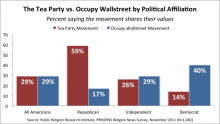
A new poll released this morning by Public Religion Research Institute shows the American public has clear ideas about what steps political leaders should take to reduce the federal deficit.
The poll shows that a majority of white evangelicals are opposed to cutting federal anti-poverty programs for the poor and nearly three-quarters of white evangelicals oppose cutting funding for religious organizations that help the poor.
The poll, based on a survey of 1,002 American adults performed November 10 -14, also shows a nation divided both by political affiliation and generation when it comes to attitudes towards Occupy Wall Street and the Tea Party.
The survey found that nearly 7-in-10 (68 percent) of Americans say that in order to reduce the deficit, it’s fair to ask wealthier Americans to pay a greater percentage in taxes than the middle class or those less well off.
UDATE via SanFrancisoGate.com : 10:36 PST OAKLAND -- The second raid of the sprawling Occupy Oakland compound led to the peaceful arrest of 32 people early this morning, and police and city officials called for calm while pledging to support the right to protest.
A legion of law-enforcement officers converged in the predawn hours on the tent city outside City Hall at 14th Street and Broadway. As the sun rose, the camp was dismantled, with officers removing tents and leading protesters away in plastic handcuffs. Other demonstrators, meanwhile, sang and marched on the street as other officers kept watch from behind metal barricades.

Police surround Occupy protest in Oakland Monday morning. Hackers threaten to "remove" Vancouver from the Internet if Occupy demonstrators are moved. Violent fringe is a challenge to Occupy movement. Are sexual assaults being under-reported at Occupy encampments? Popular Hawaiian musician occupies Obama event with a song. Occupy protesters set up camp outside a second UK cathedral. Are Occupiers the new Progressives? And much more news from the Occupy Movement worldwide inside.
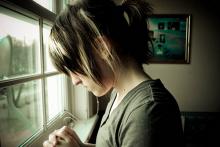
As I have read about the Occupy Movement, I have noticed many individual Christians expressing support, but little public support for the movement from the Christian community as a whole.
I have had mixed feelings about this.
Certainly support of the poor, standing up for social justice, most of what the Occupy Movement is about, coincide with what we are called to as Christian people. Yet I think it would be inappropriate for Christians to try to jump into leadership roles when the Occupy Movement is so diverse and when we have so often failed to take a stand on such issues ourselves.
It seems to me that public confession and repentance might be the best way to communicate our support with appropriate humility.
With this in mind I make the following confession as a person of Christian faith. I hope others will join me in this or similar confessions.